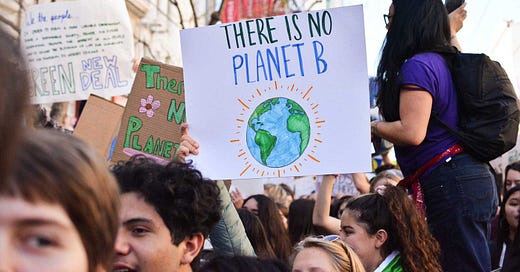Financiers on Climate Change
When a bunch of central bankers decides to go beyond their mandate and talk about climate change as a risk to finance, not just the economy, one ought to sit up and take notice.

A central banker's job is complex, involved, and extremely important. However, it has traditionally been associated with monetary policy, employment figures, and inflation. So when a bunch of central bankers decides to go beyond this mandate and talk about climate change as a risk to finance, not just the economy, one ought to sit up and take notice. The report (pdf) is around thirty pages long and quite interesting.
Who, what and why?
The Network for Greening the Financial System is a group of central bankers and banks from both developed and emerging economies which issues policy recommendations for the financial system concerning climate change. The aim is to "accelerate the work of central banks and supervisors on climate and environment and on scaling up green finance." (As an aside, it is interesting to note that the USA, China, and India are not represented within this group.)
The report focuses on climate risks rather than environmental risks. Central bankers are convinced that climate change in of itself is a major risk to the existing financial environment. Their argument is that the Paris Agreement necessitates major resource reallocations, and thus requires a proportionate response from the financial sector. If this is not done, then restricting warming to 1.5 degrees from the pre-industrial average will not succeed and average incomes will fall by a quarter by the 2050s.
Their argument is that climate change is a "structural change in the economy and financial sector" and thus falls under their mandate. It might not be within the legal mandate of most, but given that most central banks have a legal responsibility towards price stability, the safety and soundness of financial institutions and job growth in some cases, climate change has to be taken into account.
They identify two different impacts from climate change:
Physical Impacts: The effects of extreme weather, like rising sea levels, heat waves, excessive tropical storms, etc.
Transition Impacts: The impact of transitioning from a high-carbon to a low-carbon economy. While the transition needs to be quick, it ought not be so quick that it leads to a negative impact on financial and economic stability
Recommendations
The report issues 6 recommendations, the first four for central bankers and the rest for governments:
Assess climate change-related risks in the financial system and integrate them into prudential supervision
Integrate sustainability factors into their own portfolio management, specifically into their own funds, pension funds and reserves, where possible
It will be necessary to bridge data gaps, so the report suggests collaborating with the appropriate public authorities to share accurate data about Climate Risk Assessment (CRA)
Build the necessary institutional capacity and spread knowledge and awareness about the risks of climate change to both the economy in general and the financial sector in particular
Achieve robust and internationally consistent climate and environment-related disclosure
Support the development of a taxonomy of economic activities
It is heartening to see central bankers coming together and staking out their ground in the ground on climate change. While these recommendations are quite basic, they lay out the groundwork needed to do further work in this area. It would be interesting to see how far central bankers can go with these points, and see how developed and developing countries differ in implementation.


